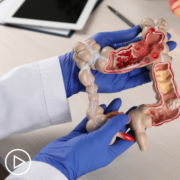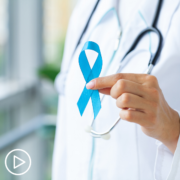What Are Key Prostate Cancer Questions to Ask Care Team Members? from Patient Empowerment Network on Vimeo.
What are key prostate cancer questions to ask care team members? Host Dr. Nicole Rochester and Dr. Yaw Nyame, and Dr. Petros Grivas provide information about vital questions to ask care providers about prostate cancer diagnosis and treatment options to work toward improved quality of life and equitable healthcare.
See More From Best Prostate Cancer Care No Matter Where You Live
Related Resources:
Transcript:
Dr. Nicole Rochester:
I’d love for each of you to share maybe a couple of key questions that patients, our care partners facing prostate cancer should ask of their treatment team to ensure that they’re receiving appropriate care.
So, we’ll start with you, Dr. Nyame. Any key questions that patients should be asking their care team when they seek treatment or diagnosis of prostate cancer?
Dr. Nyame:
Absolutely, I think that there’s a long list. Actually, I’ll tell you, my new prostate cancer diagnoses visits are usually my longest because there’s a lot to consider. I do think depending on what you’re having done and what you’re being considered for, so let’s say in the localized setting, prostate cancer is confined to the prostate, and you’re thinking about treatment like a surgery or radiation therapy, you really want to know what that center and what that provider’s experience is because we have a lot of supporting evidence that the more people doing this…no one’s going to be surprised by what I’m about to say, but the more that someone does is the better they’re going to be at it. Okay, and so making sure your team has a good experience with what you’re seeking to have done is important, and I think it’s well within your rights as a patient to understand that, so I think advocate for that. Secondly, I think basic questions, just to understand the relationship, I think…I like it when patients want to know a little bit about me because I’m going to be…they’re going to be in my hands. And so again, the importance of that relationship building and your visit is crucial.
Lastly, I think when you come to the visit, have a list of questions based off of what you’ve researched and write them down, I find my most sophisticated patients or crossing off questions as I’m talking, because they came prepared and so that preparation…the act of doing a little bit of reading, there are a lot of resources, the Prostate Cancer Foundation, for instance, has a very nice patient guide that’s written by patients and language that’s really digestible and edited by experts, and so going through that and coming with your list of questions, I think is a really important thing for your visit, and those are just a few things I can think of that can lead to a meaningful clinic visit and exchange.
Dr. Nicole Rochester:
Excellent, I’m a huge fan of questions and being prepared for visits. What about you, Dr. Grivas, are there one or two key questions that you feel patients or their care partners should ask?
Dr. Grivas:
Great answers by Dr. Nyame, I totally agree. I think started with the basics, “What this diagnosis means for me, what is the current extent of the cancer,” we call the states, and “What is the outlook, what is the overall prognosis or at least estimate of the outcome?” That’s a reasonable question to ask and again some places more detail, some others may not, and it’s important for us also to ask the base and what they want to know, how much they want to know, I would take in things of them, they want to know the entirety of the information because it makes…help them make decisions. The other, I think it’s important point, “What are the treatment options and what is the intent of the treatment, what are we trying to achieve by giving treatment, Are we trying to cure, eradicate or eliminate the culture, are we to prolong life, are we trying to improve quality of life or are we just trying control the cancer? So, what are the goals of the treatment and what are the metrics of success, so what will be a successful outcome of that treatment? How do we measure that?” And I think it’s also important.
Two more points, I would if I may. I think, again, going back to the importance of genetic counseling even more in prostate cancer, I think we recognize the importance in the aspect of patient treatment because some treatment options may depend on finding mutations. But also, the importance of the family, how much can prevent cancers in the brother family, close and extended family, if we find the mutation, can we set this mutation for other family members and do screening to prevent cancer prevention is ideal if we can do that and I think that’s a good discussion, so the patient can come to the visit if possible, by doing some homework about the family history. It’s hard for of us now, what’s happening in that chasm, right? But we do have the time to be informed of the importance of the question, this can help and expedite in our resources like to genetic counseling. And the last points, research, I want to again make the point, we should all do a better job to offer innovative clinical trials to patients across races, and it should be a very important point again equitable healthcare. And the patient should ask are clinical trials an option for me and do I have a clinical trial option? And I think it’s a great question, and hopefully this can help the patient get to integrative treatment, but also help the field.
The research would get important answers, and the important answers can be for all the community and the specific populations, if we do trials, clinical trials with only the white patients, do we have the answer for the Black patients, or we have the answer for both and other races and ethnicities as well.
Dr. Nyame:
And I do want to take this opportunity to add one more thing because Dr. Grivas was talking about what does your treatment mean for you, and in this discussion about prostate cancer, we cannot talk about what questions do you bring without mentioning the impact, quality of life of our treatments? And I think that sometimes this is the elephant in the room that leads to the decision to not pursue treatment, and so I want to take this opportunity as the urologist to say this is the time to talk about what treatment is going to do for sexual function. This is the time to talk about what treatment means for your urinary symptoms and quality of life, a good and healthy discussion around these things need to happen during your visit, because I think sometimes what patients expect to have happen with treatment and reality don’t match. And you have an expert in front of you that can really give you some input as to what to expect, and in a similar vein, when you meet with survivors, these are some of the things that I know patients tell me they’re worried about, and these are people who are living it, that can give you really valuable information on that piece of quality of life, and I hope that those conversations can help us close that treatment disparity that we see between Black men and white men with prostate cancer.















